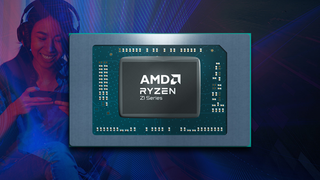When AMD introduced its Ryzen Z1 and Ryzen Z1 Extreme accelerated processing units (APUs) for handheld game consoles earlier this year it made it clear than the two processors are very different. But a new CPUID dump discovered by @InstLatX64 shows that the vanilla Ryzen Z1 is actually based on Phoenix 2 silicon with Zen 4 and Zen 4c cores.
AMD's Ryzen 7040-series (Phoenix) APU boasts eight high-performance Zen 4 cores and a GPU with 12 compute units (768 stream processors), while the Phoenix 2 has a mix of six cores: two high-performance Zen 4 cores and four energy-efficient Zen 4c cores that are notably more compact. Meanwhile, the Phoenix 2 also integrates a Radeon GPU with only four compute units (256 stream processors) that is about three times less powerful than the one used in the Z1 Extreme.
Configuration of Phoenix 2 suggests that AMD is targeting this silicon for more budget-friendly laptops rather than for gaming solutions and yet Ryzen Z1 is officially positioned as an APU for gaming consoles.
Right now, the only device that uses AMD's Ryzen Z1 is the cheap Asus ROG Ally version that is priced at $599. Yet, the full-fat Asus ROG Ally based on Ryzen Z1 Extreme costs $699 and it is unclear whether a $100 lower price justifies three times lower GPU performance and a lower-end CPU configuration.
While we can only wonder how significantly Zen 4c cores are slower than Zen 4 cores in case of Ryzen Z1 versus Ryzen Z1 Extreme, the clear performance bottleneck of this chip in games is evidently its GPU rather than CPU.


